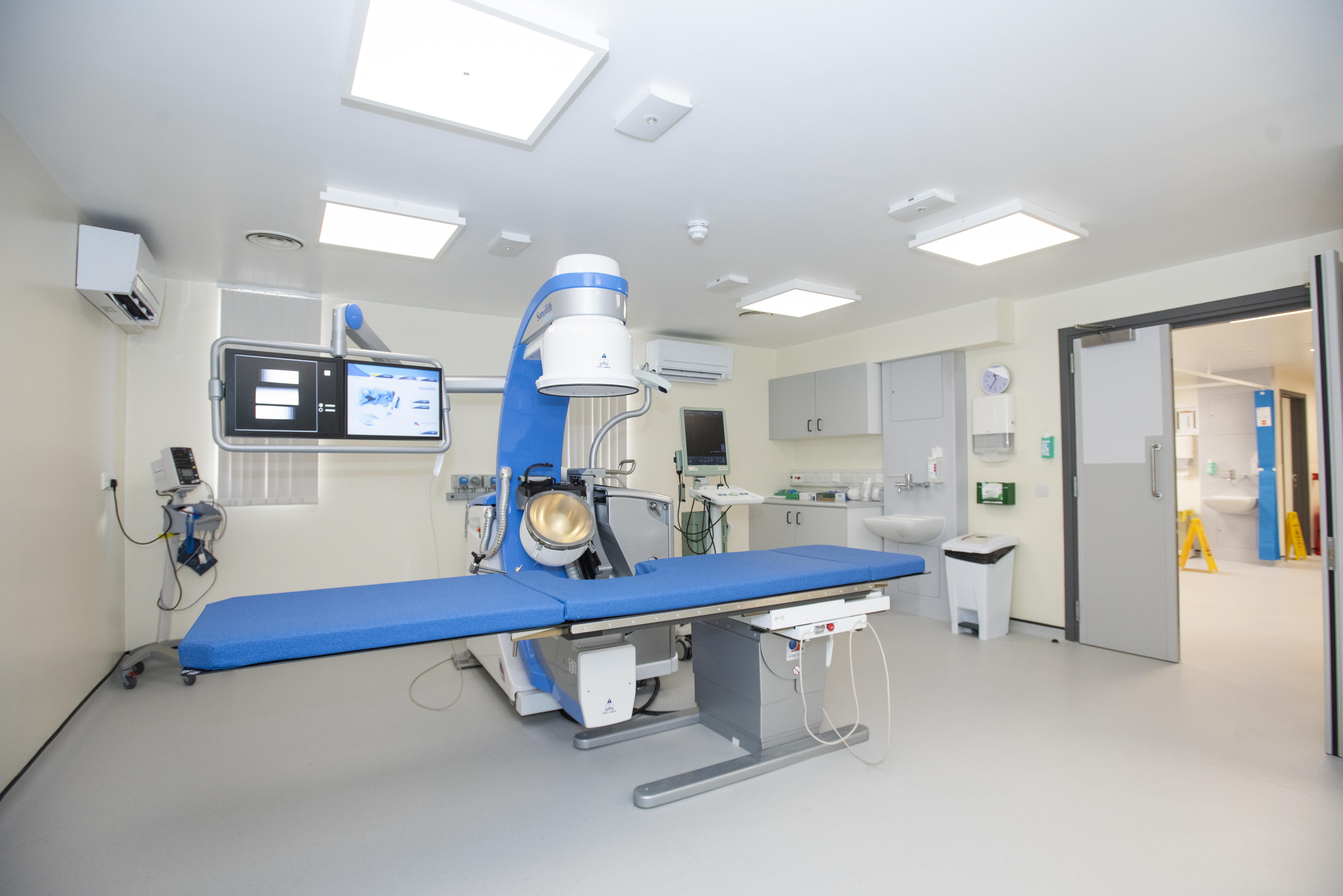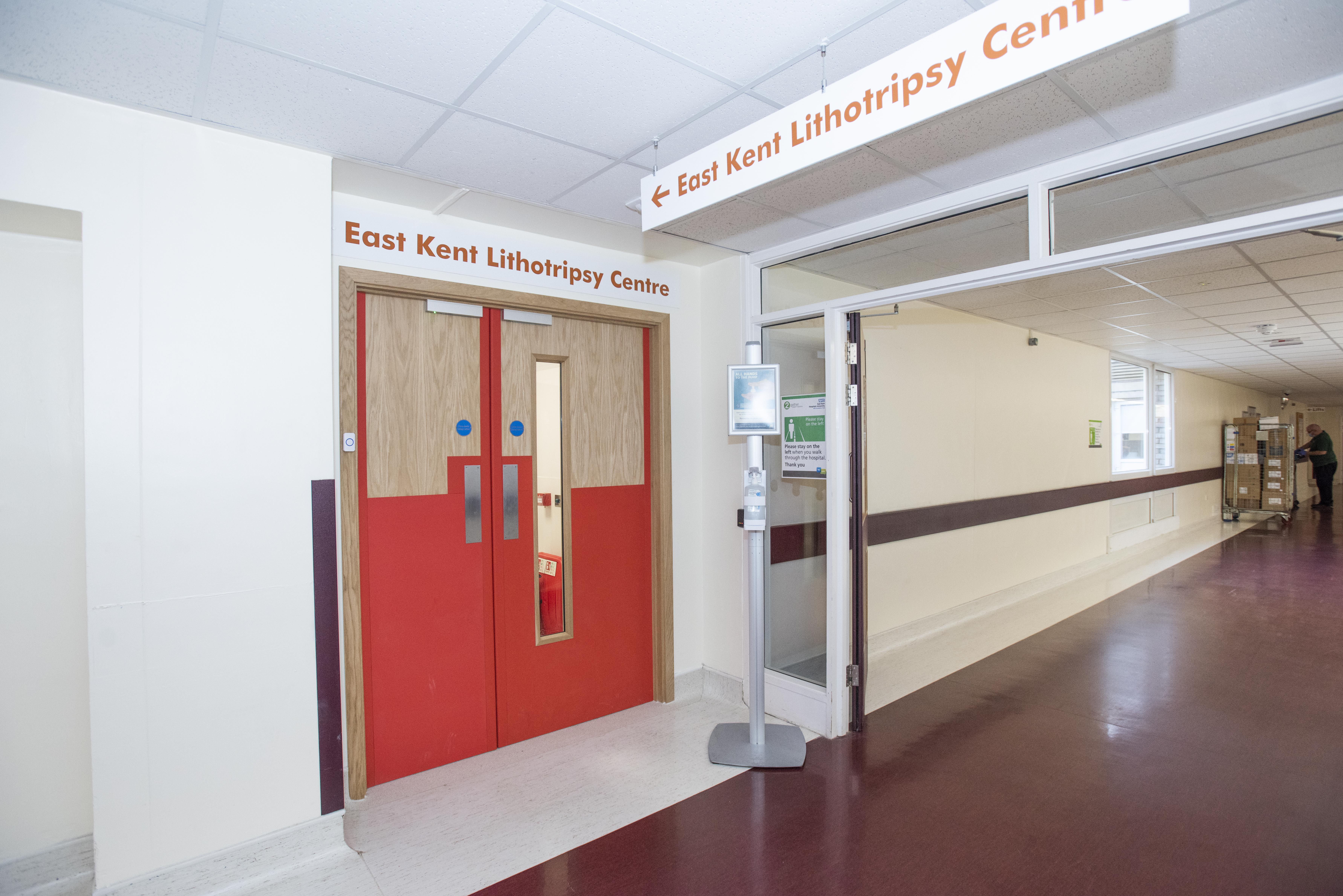Lithotripsy treatment for kidney stones
Information for patients from the East Kent Lithotripsy Centre
You have been referred by your GP to the East Kent Lithotripsy Centre, as you have been diagnosed with a kidney stone suitable for Lithotripsy treatment.
This leaflet explains the treatment you will have and explains any risks there may be regarding your treatment. If you have any questions or concerns about your condition or treatment, please speak to a member of East Kent Lithotripsy Centre staff.
What is Lithotripsy?
Lithotripsy is a shockwave treatment which breaks your kidney stone into sand-like particles, using a machine called a Lithotriptor.

These sand-like particles are then passed from your body in your urine. The Lithotriptor machine breaks over 85% of all stones treated.
The procedure uses focused shockwaves delivered through a water filled cushion placed against your side to break up the stone. The stone is targeted with the use of x-ray and ultrasound guidance.
Lithotripsy treatment does not actually remove the stone. The stones are disintegrated and particles of stone are passed out in your urine in the days following your treatment.
Treatment is carried out as a day case. There is no need to fast (not eat) before your procedure.
Should I continue taking my usual medication before my procedure?
Lithotripsy can cause bleeding / bruising in your kidney, which can be more serious if you are taking any blood thinning medication, such as Aspirin, Warfarin, Clopidogrel (Plavax), Apixaban, or Rivaroxaban (Xarelto).
If your GP has said it is safe to do so, you will need to stop taking these medications before your appointment.
If your GP says it is safe to do so, we recommend the following.
Aspirin, Clopidogrel, Plavax - stop taking seven days before your appointment.
Apixaban or Rivaroxaban (Xarelto) – stop taking three days before your appointment.
Warfarin – stop taking seven days before your appointment. Please contact your GP to arrange a blood test for the day before your appointment.
If you are taking Dabigatran (Pradaxa) or any other blood thinning medication not listed, please contact the East Kent Lithotripsy Centre for advice.
If you are unable to stop your medication or have any questions, please contact the East Kent Lithotripsy Centre.
Please contact the East Kent Lithotripsy Centre before your procedure for advice if you have:
a pacemaker or any other electronic device inside your body
a known urinary tract infection; or
any planned foreign travel within two weeks after your appointment.
What happens when I arrive for my appointment?

When you arrive at Kent and Canterbury Hospital, please come to the East Kent Lithotripsy Centre. You will be offered a hospital gown to change in to (it is helpful if you bring your own dressing gown to wear) and to give a urine sample. Please do not empty your bladder before your appointment.
You will then have some up-to-date imaging carried out, normally an x-ray to check the position of your stone before your treatment. The position of a stone can often change, and imaging allows careful planning of your procedure. More information about x-rays will be available to you when you come to hospital for your treatment.
A specialist radiographer and nurse will check your x-rays to see if your stone is still in a position for lithotripsy treatment and there are no reasons why you cannot have treatment.
Once it has been decided that your treatment can begin, the procedure will be explained to you and we will ask for your consent to continue with treatment. Please use this time to ask any further questions. Remember you can withdraw consent for treatment at any time.
How long does the treatment take?
You will be lying flat for about 30 to 60 minutes, while your treatment takes place. But be prepared to be in the department for two to three hours in total.
Will the treatment hurt?
During your treatment you may feel like you are being flicked with an elastic band. You will hear and be aware of a tapping sensation, you may also feel a deeper discomfort in your kidney.
Patients experience of this varies; some feel little discomfort while others may need extra pain relief. A stronger painkiller can be given by injection, but only if needed. However, if you have the stronger painkiller you must not travel home alone, drive, or operate machinery for 24 hours. We ask that you arrange for someone to take you home after your procedure.
What happens after my procedure?
You will be discharged home with advice on what to do if you have any concerns.
How will I feel after my procedure?
Most patients will feel fine after their treatment, although you may feel some discomfort in the area that was treated.
Can I drive after my procedure?
Please bring someone with you to your appointment. We may need to give you stronger painkillers by injection. If this happens you will need someone to take you home and you must not drive for 24 hours.
What should I do when I return home?
It is important that you increase how much you drink after your treatment. You need to drink two to three litres of water for the first day or two after your procedure. This will help the stone fragments to pass out of your system.
Your normal pain relief (for example paracetamol) can be taken as needed. If pain continues, contact your GP or NHS 111 for advice.
You will be given discharge advice before you leave hospital.
Will I have a follow-up appointment?
If a follow-up appointment is needed, this will be arranged before you leave the East Kent Lithotripsy Centre.
If we feel your treatment has successfully broken the stone, we will arrange for an x-ray to be taken at your local hospital to assess if the stone fragments have cleared. It is important for you to attend any follow-up arranged.
When will I get my results?
Your x-ray will be checked by the stone team and you will be contacted by telephone with your results. These results will also be sent to you by letter.
Are there any risks to this procedure?
Although a relatively safe form of treatment for stones, Lithotripsy is not without risk. Please read the following risks / complications before giving your consent for treatment (source: British Association of Urological Surgeons (BAUS)).
Common side effects (between one in two and one in 10 patients will experience the following)
Blood in your urine; which may last one to two days.
Pain, as small fragments of the stone pass out of your body.
Further lithotripsy treatment to clear any remaining stone(s).
Failure to break the stone.
Occasional side effects (between one in 10 and one in 50 patients will experience the following)
Urinary tract infection from bacteria released from the stone.
Bruising or blistering of the skin at the site of shockwave entry.
Stone fragments may get stuck in the ureter (the tube between the kidney and the bladder) causing a blockage. The patient may need to return to hospital and have further surgery to unblock their kidney or remove the stone fragment.
Rare side effects (between one in 50 and one in 250 patients will experience the following)
Kidney damage caused by severe bruising.
Severe infection needing hospital treatment with intravenous antibiotics and sometimes drainage of the kidney by a small drain placed through the back into the kidney or through the bladder into the kidney.
Damage to other organs such as the pancreas, lungs, spleen, liver, and bowel.
If you have any of these side effects or have any concerns, please contact the Stone Unit at Kent and Canterbury Hospital on telephone 01227 866462 or email.
Are there alternative treatments?
The following are alternatives to Lithotripsy. You can discuss these options with your doctor.
Ureteroscopic surgery performed with a telescope under general anaesthetic, breaking the stone with a laser.
Percutaneous (keyhole) surgery is a direct puncture through the skin into your kidney to remove the stone.
Observation. If stones are less than 5mm, there is a chance (95 in every 100 cases) that the stone will pass without any treatment.
When can I return to my normal activities?
You may feel tired the day after your procedure but you can carry out your normal day to day activities.
If you have been given an injection of stronger painkiller during your treatment you must not drive, operate heavy equipment, or sign any legal documents for 24 hours.
When can I return to work?
This will depend on your level of pain, so will vary from patient to patient.
Further information
For more information on stone removal please look at the following information produced by the BAUS.
Keeping your Appointment
If you cannot keep your appointment, or have been given one that is unsuitable, please change it by phoning the number on your appointment letter. Your call will give someone else the chance to be seen and will help us keep waiting times to a minimum.
Patient Transport
You can find out if you are eligible for patient transport by calling the freephone G4S bookings line on 08000 960211, 24 hours a day.